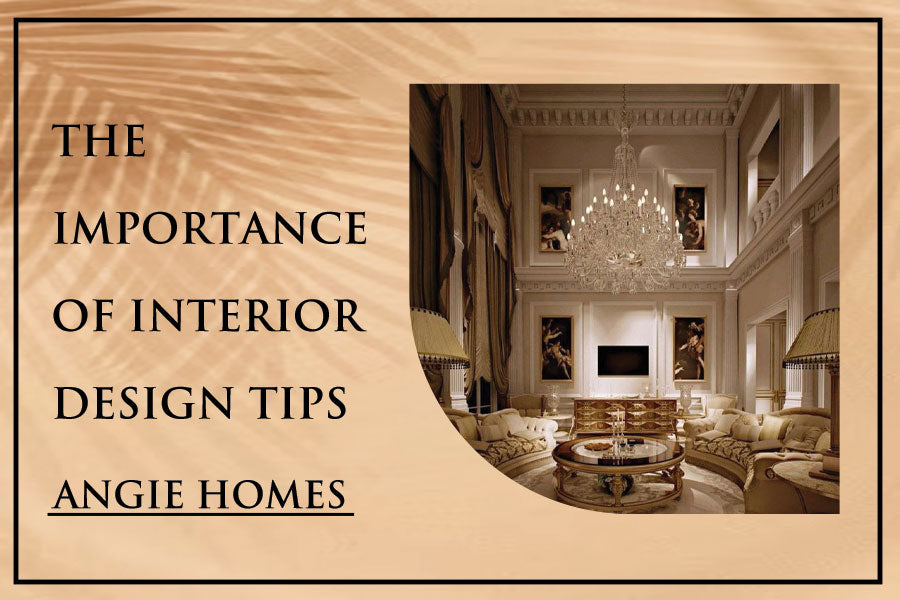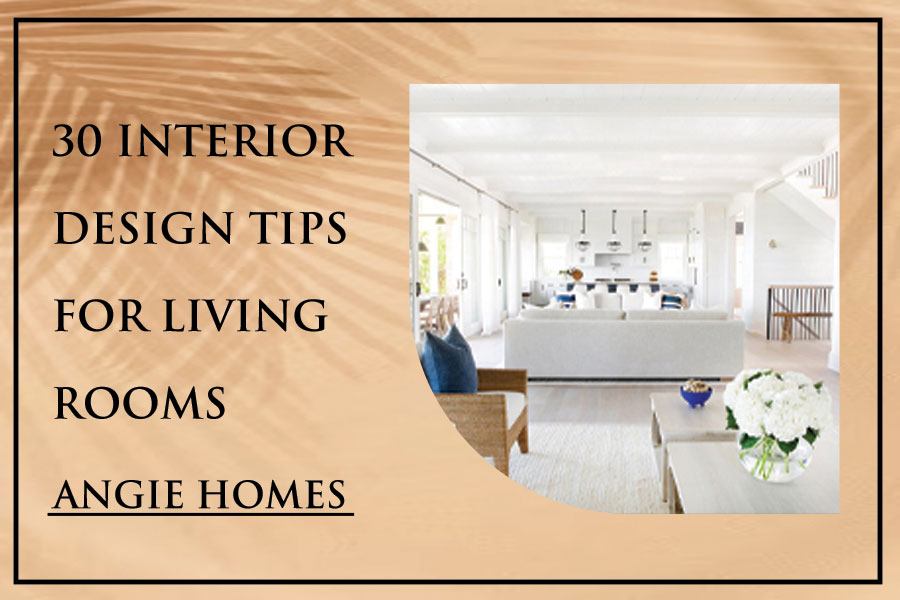Introduction
In the realm of home design, the living room stands as the nucleus of a residence. It's the space where families gather, guests are entertained, and memories are created. The art of interior design tips transforms these spaces into harmonious and aesthetically pleasing environments. The journey towards creating the perfect living room involves not just creativity but also a deep understanding of design principles. In this comprehensive article, we will delve into the intricate world of interior design tips, focusing particularly on living rooms.
What is Living Rooms?

The living room is more than just a physical space; it's a reflection of the inhabitants' personalities and lifestyles. It is a multifunctional area that accommodates various activities, from relaxation and entertainment to socializing and work. Interior design for living rooms involves a careful curation of elements such as furniture, color schemes, lighting, and decor, aiming to strike a balance between functionality and aesthetics.
The Importance of Interior Design Tips

Why do interior design tips matter, especially when it comes to living rooms? The significance lies in the fact that a well-designed living room can enhance the quality of life, promote positive emotions, and create a welcoming atmosphere. Effective interior design tips act as guiding principles, helping individuals make informed decisions about layout, colors, and decor that align with their preferences and needs.
30 Interior Design Tips for Living Rooms

1. Choosing the Right Color Palette
The color palette sets the tone for the entire living room. Whether it's calming neutrals, bold contrasts, or a mix of vibrant hues, choosing the right colors as interior design tips can significantly impact the mood and atmosphere of the space.
2. Furniture Arrangement
Proper furniture arrangement is crucial for a functional and visually appealing living room. Consider the room's layout, traffic flow, and focal points when arranging sofas, chairs, and tables.
3. Lighting Matters
Lighting can transform the ambiance of a room. Incorporate in your interior design tips a mix of ambient, task, and accent lighting to create a layered and inviting atmosphere in your living room.
4. Textures and Fabrics
Textures add depth and visual interest to a space. Experiment with different fabrics for upholstery, throw pillows, and blankets to introduce tactile elements into your living room design.
5. Wall Art and Decor
Blank walls offer a canvas for personal expression. Choose art and decor interior design tips that resonate with your style, whether it's contemporary paintings, vintage posters, or a gallery wall of family photos.
6. Creating Focal Points
Establishing a focal point anchors the room and draws attention. This could be a fireplace, a statement piece of furniture, or an accent wall with bold wallpaper.
7. Maximizing Natural Light
Natural light is a powerful design elementwhen it comes to interior design tips. Arrange furniture to maximize exposure to natural light and consider light-filtering window treatments for privacy without sacrificing brightness.
8. Flooring Selection
Flooring sets the foundation for the room's aesthetic. Choose flooring materials for interior design tips that complement the overall design and are practical for the level of foot traffic in the living room.
9. Incorporating Plants
Indoor plants not only add a touch of nature but also contribute to better air quality. Select plants that thrive indoors and complement the design scheme.
10. Personalization and Unique Elements
Inject your personality into the interior design tips with unique and personalized elements. This could be a custom-made coffee table, handcrafted decor items, or vintage finds that tell a story.
11. Balancing Scale and Proportion
Achieving balance in scale and proportion in your interior design tips ensures that the furniture and decor in the room complement each other harmoniously. Avoid overcrowding or sparse arrangements.
12. Functional Storage Solutions
Incorporate storage solutions in your interior design tips that blend seamlessly with the design. Ottomans with hidden storage, built-in shelving, and stylish cabinets can help keep the living room clutter-free.
13. Mixing Old and New
Create a timeless and eclectic look by mixing vintage and modern elements with your interior design tips. This adds character and depth to the living room, showcasing a curated collection of pieces with diverse histories.
14. Mirrors for Illusion
Mirrors can visually expand a space, making it feel larger and more open. Strategic placement of mirrors reflects light and adds a touch of glamour to the living room.
15. Smart Technology Integration
In the digital age, integrating smart technology into the living room interior design tips enhances convenience and efficiency. Conceal wires, use smart lighting, and incorporate devices seamlessly into the decor.
16. Accentuating Architectural Features
Highlighting architectural features with interior design tips like exposed beams, archways, or built-in niches adds character to the living room. Use lighting and color to draw attention to these unique elements.
17. Harmonizing Textures
Create visual interest by harmonizing different textures. Pair smooth surfaces with rough textures, soft fabrics with hard materials, to add depth and warmth to the living room.
18. The Power of Rugs
Rugs define and anchor different zones within the living room and are one of the best interior design tips. Choose rugs that complement the overall color scheme and add coziness to seating areas.
19. Window Treatments
Window treatments contribute to the overall aesthetic while providing privacy and light control. Consider curtains, blinds, or shades that enhance the style of your living room.
20. Decluttering Strategies
One of the best interior design tips is to maintain a clutter-free living room is essential for a serene atmosphere. Implement storage solutions, and regularly declutter to create a space that feels organized and inviting
21. Statement Furniture Pieces
Invest in statement furniture pieces is one of the interior design tips as they become focal points in themselves. Whether it's a unique coffee table, an artistic chair, or a bold sofa, let one or two pieces steal the show.
22. Incorporating Trends Wisely
While trends can inspire, they should be incorporated judiciously. Opt for timeless design elements and introduce trends in smaller, interchangeable decor items that can be easily updated.
23. Artistic Wall Paint Techniques
Explore creative wall paint techniques for interior design tips to add depth and personality. This could include accent walls, textured finishes, or artistic murals that make a bold statement.
24. Sustainable Design Practices
Consider interior design tips like eco-friendly materials and sustainable design practices for a living room that not only looks good but also aligns with environmental consciousness.
25. Utilizing Odd Numbers
In design, odd numbers are visually appealing. Arrange decor items, such as vases or candles, in groups of three or five to create a sense of balance and harmony.
26. The Impact of Scent
Scent is a powerful yet often overlooked element in interior design tips. Use candles, diffusers, or fresh flowers to introduce pleasing scents that contribute to the overall sensory experience.
27. Room Dividers
For open-concept living spaces, consider room dividers to delineate different zones. This not only adds functionality but also enhances the visual appeal of the room.
28. DIY Decor Projects
Infuse a personal touch into your living room with DIY decor interior design tips. Whether it's upcycling furniture or creating custom wall art, embrace your creativity in design.
29. Consistency in Style
Maintain consistency in the design style throughout the living room. This creates a cohesive and harmonious look, whether your preference is modern, traditional, or eclectic.
30. Continuous Learning in Design
Include interior design tips in your overall plan. Stay updated on design trends, attend workshops, and engage in continuous learning to refine your skills and keep your living room design fresh.
Conclusion
In conclusion, the art of interior design tips for living rooms is a nuanced and dynamic process that requires a blend of creativity, functionality, and a deep understanding of design principles. From choosing the right color palette to incorporating sustainable practices, each tip contributes to the creation of a living space that not only looks aesthetically pleasing but also enhances the quality of life for its inhabitants. By considering the 30 interior design tips discussed in this article, individuals can embark on a journey to transform their living rooms into personalized sanctuaries that reflect their unique tastes and lifestyles. Remember, interior design tips is not just about aesthetics; it's about creating a space that tells a story and feels like home.
Related Posts :
How To Pair Fabric and Wallpaper : A Comprehensive Guide
Walls That Wow: Enhancing Your Decor with Stylish Wall Sconces
Best Fabrics for Walls : Enhancing Interiors with Style and Texture
How to Cover a Wall With Fabric: Transform Your Space with Angie Homes
Transform Your Space with a DIY Fabric Feature Wall: A Comprehensive Guide
Elegant Walls: A Comprehensive Guide to Fabrics For Wall Decor
The Ultimate Guide to Bedroom Walls: Aesthetic, Decor and Harmony
A Complete Guide to Bedroom Wall Design
Kitchen Design Ideas: Things You Need to Consider
Classic Apartments Interior: Timeless Elegance and Comfort
Modern Apartments Interior Solutions: Elevating Contemporary Living
Harmony in Diversity: Unlocking the World of Fusion Apartments Interior Solutions
Bar Area Interior Solutions: Elevating Spaces with Style and Functionality
Mediterranean Bedroom Design Ideas: Bring the Coastal Vibe Home
Designing the Perfect Home Bar: A Blend of Style and Functionality
An Ultimate Guide to Bedroom Designs
Exploring the World of Kids Bedroom Designs: A Comprehensive Guide
FAQ's
Q. How to change the interior of a living room?
Ans: To transform your living room, start by selecting a new color scheme, rearrange furniture for better flow, and add or update key decor pieces and incorporate other interior design tips. Consider incorporating new textures, changing lighting fixtures, and investing in statement furniture to create a fresh look.
Q. How can I make my living room attractive?
Ans: Enhance your living room's attractiveness by focusing on key elements like color coordination, balanced furniture arrangement, and adequate lighting. Introduce decorative accessories, artwork, and plants for visual interest, and keep the space clutter-free for a clean, inviting atmosphere.
Q. How can I improve my living room?
Ans: To improve your living room, assess its functionality and aesthetics. Consider interior design tips like upgrading furniture for comfort and style, experiment with lighting solutions, add personalized decor, and invest in quality textiles. Create a cohesive design by selecting a theme or color palette that resonates with your taste.
Q. How can I add style to my living room?
Ans: Infuse style into your living room by incorporating unique furniture pieces, mixing patterns and textures, and adding curated decor items. Experiment with bold color choices or subtle neutrals, and consider incorporating elements of current design trends in a way that complements your personal aesthetic.
Q. What are the 7 rules of interior design?
Ans: The seven fundamental rules of interior design tips include balance, emphasis, contrast, rhythm, scale and proportion, harmony, and unity. These principles guide designers in creating cohesive and visually appealing spaces by ensuring a thoughtful and well-balanced arrangement of elements.
Q. What are the 7 elements of interior design?
Ans: The seven essential elements of interior design tips are space, form, line, color, texture, pattern, and light. Designers manipulate these elements to create well-designed and functional spaces that cater to the needs and preferences of the inhabitants.
Q. How can I be successful in interior design?
Ans: To succeed in interior design, cultivate a strong foundation in design principles, stay updated on industry trends and interior design tips, and develop excellent communication and client management skills. Build a portfolio showcasing your diverse projects, network within the design community, and continually seek opportunities for professional development and learning.
